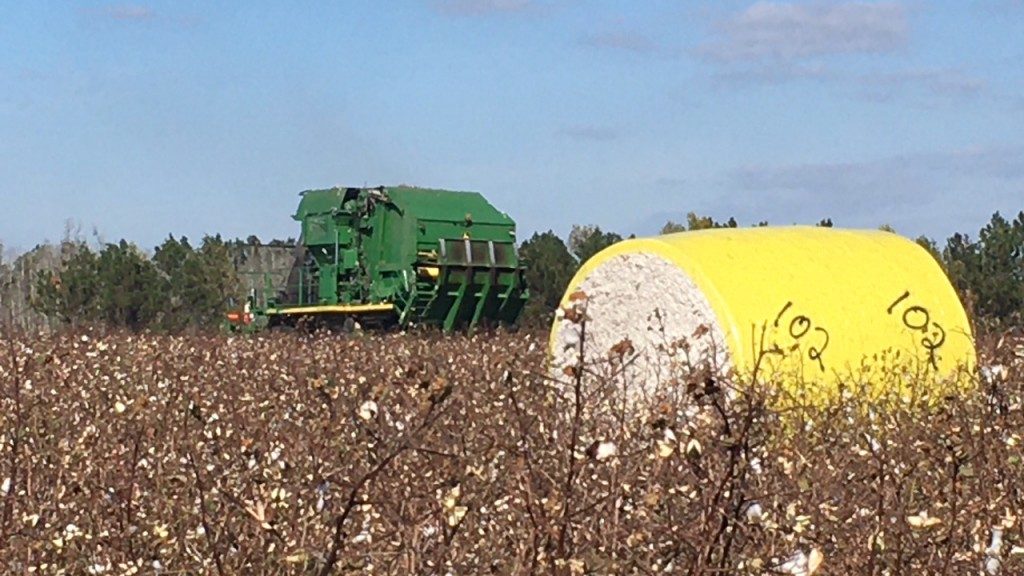Jeremy Kichler
-
Dr. Wes Porter, UGA Irrigation Specialist, has provided a few tips on irrigation. As we all know we are predicted to have some extremely high temperatures over the next week or so, and are not predicted to receive any rainfall in the “long-term” forecast. He has compiled some recommendations and considerations for our three major…
-
The weather forecast for Tifton and many other areas of south Georgia over the next 10 days is not great (> 85 F and < 35% chance of rain). Consequently, growers are wondering if it is a good or bad idea to irrigate cracking peanuts that received a PRE application of Valor. Growers are very…
Posted in: Peanuts -
Next week is shaping up to be a challenging week for cotton planting, similar to late May of 2019. Remember that soil temperatures greatly influence cotton emergence, Figure 1 includes a graph from a USDA manuscript sharing the relationship of lateral cotton root development as influenced by soil temperature (McMichael and Burke, Environmental and Experimental…
Posted in: Cotton -
The most effective approach to minimize cotton injury from preemergence (PRE) herbicides is to place the cotton seed in moist soil where it can imbibe (absorb) clean water free of herbicides (Figure 1). Next, we need our cotton roots to “out run” the herbicide as the herbicide is moving down into the soil with rainfall…
-
Kemerait and Brenneman Over the next week, temperatures in southern Georgia as expected to be near 100 degrees for several days. Such very warm conditions can bring a greater urgency to early-season disease control in the peanut crop with regards to Aspergillus crown rot and white mold. Risk to losses from these diseases can be…
Posted in: Peanuts -
Topics this week include Tropical spiderwort, thrips, residual herbicides, pecan casebearer, and hay. Rain over the last week has presented numerous challenges for cotton and peanut producers. Currently In Colquitt County, it is estimated that 40-50 percent of cotton crop and 50-60% of the peanut crop is planted. Corn crop ranges from V3 to V10.…
-
In this issue: Dicamba Label Update, Pecan Casebearers?, How many pounds of peanut seed do I need?, Hey Bob, I have a question about how to apply liquid nematicides and fungicides in-furrow…, Tips on Managing Seedling Disease In Cotton and How late can I plant my corn? Dicamba Label Update… On April 26, 2021 the…
-
It is amazing how much rain we received last weekend in Colquitt County. I have had reports of rainfall amounts from 3.5 to 7 inches of rain in this area and a report or two of small hail. Below is information from Dr. Pam Knox on rainfall amounts from the past week from her blow…
-
Topics this week includes infurrow treatments for cotton and peanut. Nitrogen applications and weed control in corn. Thoughts on cotton weed control… BURNDOWN: Palmer amaranth must not be emerged when planting, regardless of cotton cultivar planted. Standard programs using Valor (before Palmer emergence), Direx, and Gramoxone + Direx are advised. Dicamba or 2,4-D would be…
-
Topics this week include sulfur fertilization in corn, tissue sampling in corn, summer annual forages, sampling baleage and lawn burweed. How can I take the paraquat test? Before mixing, loading, and/or applying paraquat, new labels require the completion of on-line training https://www.epa.gov/pesticide-worker-safety/paraquat-dichloride-training-certified-applicators approved by the U.S. EPA. Thanks to the National Pesticide Safety Education Center, GDA…
